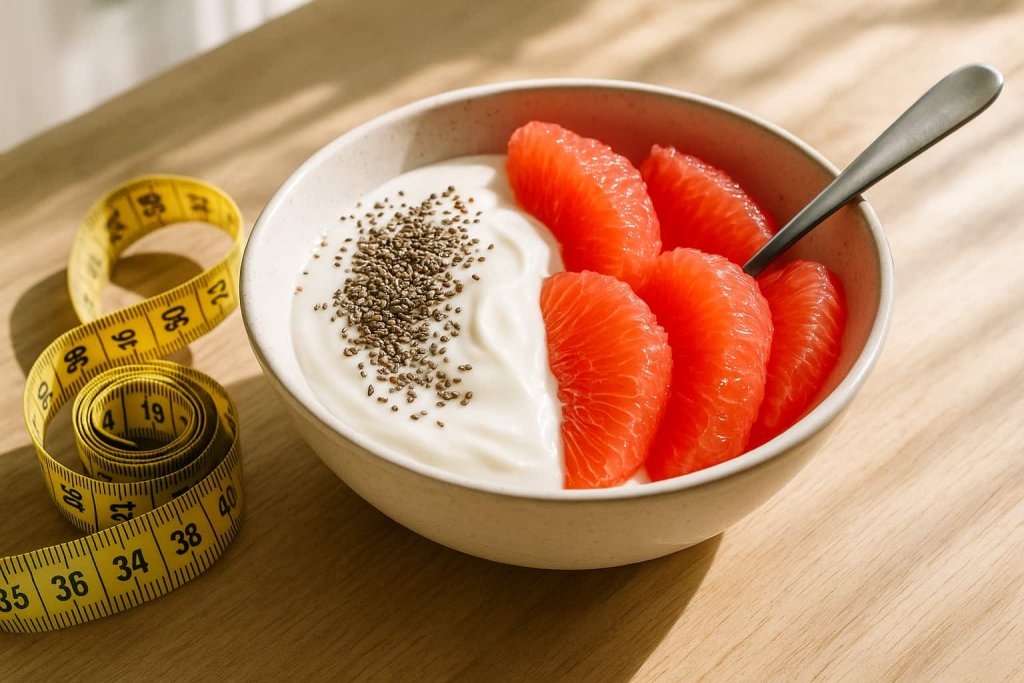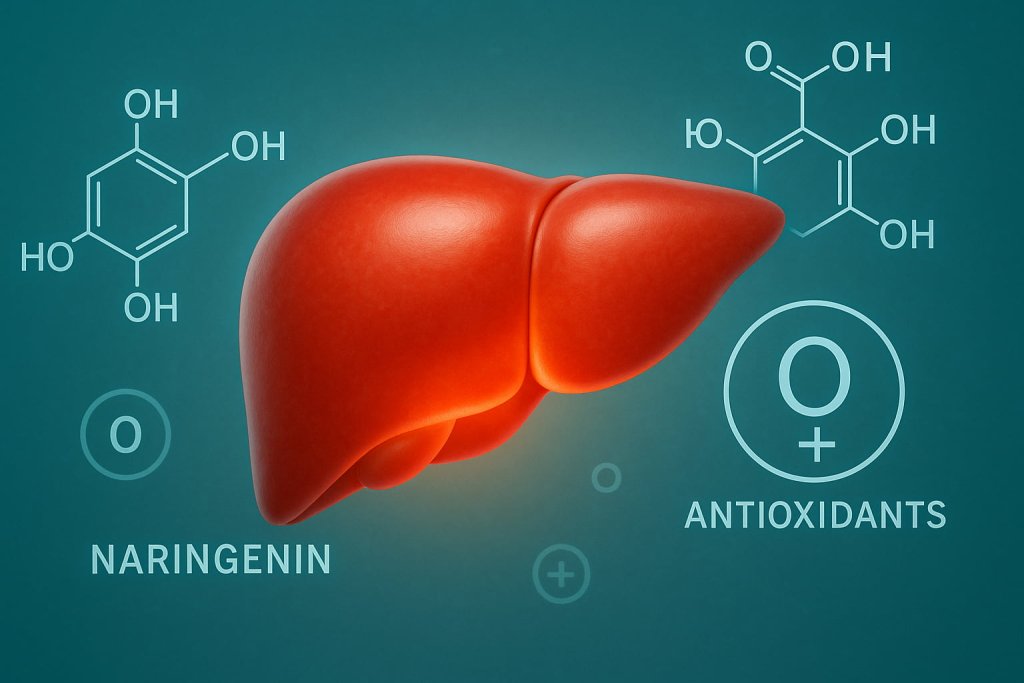Grapefruit is rich in vitamin C, antioxidants, and fiber that may support heart health, weight management, and immune function.
This tangy citrus fruit is more than a refreshing breakfast staple — it’s a powerhouse of nutrients linked to improved metabolic, cardiovascular, and overall wellness. Understanding grapefruit’s nutritional value helps you make informed choices about including it in your balanced diet while staying aware of important safety considerations.

What Is Grapefruit?
Grapefruit (Citrus × paradisi) is a hybrid between sweet orange and pomelo, native to the Caribbean. It’s commonly eaten fresh, juiced, or added to salads and smoothies. Available in pink, red, and white varieties, grapefruit’s distinctive tart-sweet flavor comes from its unique mix of natural acids, sugars, and bioactive compounds such as flavanones (especially naringin) and carotenoids like lycopene and β-carotene.
Nutritional Profile of Grapefruit
According to the USDA FoodData Central, one medium grapefruit (about 230 g) provides:
| Nutrient | Amount | % Daily Value* |
|---|---|---|
| Calories | 82 kcal | — |
| Vitamin C | 77 mg | 86% |
| Vitamin A (as carotenoids) | 92 µg RAE | 10% |
| Potassium | 320 mg | 7% |
| Fiber | 2.5 g | 9% |
| Water | 88 g | — |
*Daily values based on a 2,000-calorie diet.
Grapefruit is low in calories yet nutrient-dense — ideal for those aiming to maintain energy balance and hydration.
10 Proven Health Benefits of Grapefruit (Backed by Science)
1. Supports Immune Function

Grapefruit is rich in vitamin C, a key nutrient that supports immune defenses and helps protect cells from oxidative stress. Adequate vitamin C intake assists in the normal function of white blood cells and enhances the body’s ability to defend against infections.
According to the National Institutes of Health (NIH) – Office of Dietary Supplements, maintaining sufficient vitamin C levels contributes to faster recovery from common illnesses and overall immune resilience. Regular consumption of grapefruit — whether fresh or juiced — can be an easy way to meet daily vitamin C needs naturally.
2. Promotes Heart Health

Regular grapefruit consumption may support cardiovascular wellness by helping maintain healthy cholesterol and blood pressure levels.
A 2023 study published in the Journal of Agricultural and Food Chemistry found that naringin, a flavonoid abundant in grapefruit, may help modulate lipid metabolism and reduce oxidative stress, key factors in heart health.
Additionally, grapefruit’s potassium content supports healthy blood pressure by counteracting sodium’s effects in the body.
For further insight, see the American Heart Association’s discussion on grapefruit and heart health.
3. May Aid Weight Management

With its low calorie, high fiber, and high water content, grapefruit can support weight management by promoting satiety and helping control appetite.
Clinical research published in Nutrition & Metabolism showed that participants who consumed half a grapefruit before meals experienced modest weight loss and improved insulin sensitivity.
While grapefruit alone isn’t a weight-loss solution, including it as part of a balanced diet may support calorie control and metabolic health.
4. Helps Regulate Blood Sugar Levels

Grapefruit is naturally rich in naringenin, a citrus flavonoid that may help support blood sugar regulation and metabolic balance. These bioactive compounds influence pathways involved in glucose uptake and insulin sensitivity—two critical factors for maintaining steady energy and healthy metabolism.
A 2022 peer-reviewed study published in the Journal of Nutritional Biochemistry found that naringenin and its glycoside naringin, both abundant in citrus fruits like grapefruit, improved insulin resistance, fasting glucose levels, and lipid metabolism in experimental models. The researchers attributed these benefits to the flavonoids’ strong antioxidant and anti-inflammatory properties, which may help protect pancreatic and liver cells responsible for glucose control.
Although most evidence is based on laboratory and animal studies, emerging research suggests that including grapefruit in a balanced, fiber-rich diet may help support healthy blood sugar levels as part of an overall wellness plan. Individuals with diabetes or those taking glucose-regulating medications should always consult a healthcare professional before increasing grapefruit intake.
5. Supports Digestive Health

Grapefruit’s fiber and high water content promote digestive regularity and gut health. Dietary fiber adds bulk to stool, aids normal bowel movements, and provides nourishment for beneficial gut bacteria.
According to the Cleveland Clinic, fiber-rich fruits such as grapefruit support digestive comfort, help reduce constipation, and contribute to long-term colon health. Enjoying fresh grapefruit segments or adding them to salads can boost daily fiber intake naturally.
6. Rich in Antioxidants

The red and pink varieties of grapefruit are naturally rich in antioxidant compounds such as vitamin C, β-carotene, lycopene, and flavonoids (notably naringin). These nutrients play a vital role in helping the body neutralize free radicals, which are unstable molecules that can contribute to oxidative stress — a process linked to premature aging and various chronic conditions.
A 2022 review published in Frontiers in Pharmacology highlighted that dietary polyphenols, including those found in citrus fruits like grapefruit, demonstrate significant antioxidant and anti-inflammatory properties. These compounds may help protect cells from oxidative damage and support long-term metabolic and cardiovascular health.
7. May Support Skin Health

Grapefruit is an excellent source of vitamin C, a nutrient essential for collagen synthesis, which helps maintain skin elasticity, firmness, and a youthful appearance. Collagen forms the structural framework of the skin, and sufficient vitamin C intake supports its production while reducing signs of oxidative stress caused by environmental factors such as UV exposure and pollution.
According to the Harvard T.H. Chan School of Public Health, vitamin C acts as a potent antioxidant that protects the skin from free radical damage and contributes to the maintenance of healthy connective tissue. This dual action — stimulating collagen formation and limiting oxidative damage — makes grapefruit a beneficial addition to a skin-supportive diet.
8. Promotes Hydration and Electrolyte Balance

Grapefruit is composed of nearly 90% water, making it a refreshing source of hydration. Its natural potassium content also supports electrolyte balance and muscle function.
The U.S. Department of Agriculture (USDA) lists grapefruit as a hydrating fruit that contributes to daily fluid intake, making it beneficial after workouts or in warm climates to help prevent dehydration.
9. May Support Liver and Metabolic Function

Emerging studies suggest that naringenin, one of grapefruit’s primary bioactive compounds, may support liver function and overall metabolic health.
According to the National Library of Medicine, naringenin may assist in balancing liver enzymes and reducing fat accumulation in the liver — mechanisms linked to metabolic well-being.
Although these findings are promising, more human studies are needed to confirm long-term benefits.
10. Contributes to Overall Wellness

Including grapefruit regularly in your diet provides a diverse mix of vitamins, minerals, antioxidants, and hydration benefits that support whole-body wellness.
As summarized by Medical News Today, grapefruit consumption is associated with better nutrient intake, improved diet quality, and positive effects on metabolic and cardiovascular health.
Adding grapefruit to meals or snacks can be a simple, refreshing way to boost daily nutrition and promote vitality.
Possible Side Effects and Precautions
While grapefruit offers many wellness benefits, it can interact with certain medications and may not be suitable for everyone. The fruit contains compounds called furanocoumarins, which inhibit the CYP3A4 enzyme in the small intestine. This enzyme is responsible for metabolizing many prescription drugs. When it’s blocked, medication levels in the bloodstream can rise, increasing the risk of side effects.
According to the U.S. Food and Drug Administration (FDA), grapefruit and grapefruit juice can interfere with drugs such as:
- Certain statins (for cholesterol management)
- Calcium channel blockers (for blood pressure control)
- Some immunosuppressants, anti-anxiety, and anti-arrhythmic drugs
Other precautions:
- People with sensitive stomachs may experience mild acidity or heartburn.
- Those with citrus allergies should avoid grapefruit.
- Pregnant or breastfeeding individuals should consult a healthcare provider before increasing citrus intake.
Key takeaway: Always discuss grapefruit consumption with your doctor or pharmacist if you take prescription medications.
How to Eat Grapefruit for Best Results
Incorporating grapefruit into your meals can be refreshing and nutritious. To enjoy it safely and maximize its benefits:
- Start your day smartly: Eat half a fresh grapefruit or drink ½ cup (120 ml) of unsweetened juice at breakfast.
- Pair with protein and healthy fats: Combine grapefruit with yogurt, eggs, or avocado to balance blood sugar and improve nutrient absorption.
- Add to meals: Use grapefruit segments in salads or as a tangy topping for grilled fish or leafy greens.
- Avoid added sugars: Choose fresh or 100% juice options without syrups or sweeteners.
For more healthy meal pairing ideas, see the Harvard T.H. Chan School of Public Health – Healthy Eating Plate.
Recommended Serving and Storage Tips
Proper handling preserves both freshness and safety. Follow these guidelines based on FDA Food Safety Guidance:
- Serving size: ½ medium grapefruit or about ½ cup (120 ml) of juice.
- Storage: Keep whole grapefruits at room temperature for up to 1 week or refrigerate at ≤ 40 °F (4 °C) for up to 3 weeks.
- Preparation: Rinse under clean running water before cutting.
- Avoid contamination: Use separate cutting boards for produce and raw meat.
- Consume promptly: Eat within a few days of peeling for the best flavor and vitamin retention.
FAQs
1. Can grapefruit interact with medications?
Yes. Grapefruit may interfere with the metabolism of certain drugs via the CYP3A4 enzyme. Always consult your doctor before combining grapefruit with prescription medications.
2. Is pink grapefruit healthier than white grapefruit?
Pink and red varieties contain more lycopene and beta-carotene, making them slightly richer in antioxidants.
3. Can people with diabetes eat grapefruit?
Yes, in moderation. Grapefruit has a moderate glycemic index and may support insulin sensitivity when part of a balanced diet.
4. How much grapefruit should I eat per day?
Half a medium grapefruit (or about ½ cup of juice) is generally considered a healthy serving for most adults.
5. Is grapefruit juice as beneficial as the whole fruit?
Whole grapefruit offers more fiber and fewer natural sugars, making it the better choice for blood sugar balance.
6. Can I eat grapefruit at night?
Yes. It’s hydrating and low in calories, though its natural acidity may not suit individuals prone to acid reflux.
7. Who should avoid grapefruit?
People taking certain medications (like statins or immunosuppressants) should avoid it unless cleared by a healthcare professional.
Conclusion
Grapefruit is a nutrient-dense citrus fruit packed with vitamin C, antioxidants, and fiber that may support immune, heart, and metabolic health. When enjoyed responsibly, it can be a refreshing way to enhance your diet’s nutritional quality.
For best results, pair grapefruit with balanced meals, follow safe food handling practices, and consult your doctor if you take medications that may interact.
This content is for informational purposes only and not medical advice.
References:
